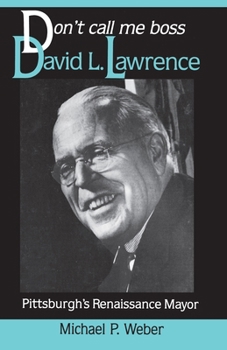Dont Call Me Boss: David L. Lawrence, Pittsburgh's Renaissance Mayor
Select Format
Select Condition 
Book Overview
The death of David Leo Lawrence in 1966 ended a fifty-year career of major influence in American politics. In a front-page obituary, the New York Times noted that Lawrence, the longtime mayor of Pittsburgh, governor of Pennsylvania, and power in Democratic national politics, disliked being called Boss. But, the Times noted, \u201che was one anyway.\u201dCertainly Lawrence was a consumate politician. Born in a poor, working-class neighborhood, in the present-day Golden Triange of Pittsburgh, he was from boyhood an astute student of politics and a devoted Democrat. Paying minute attention to every detail at the ward and precinct level, he revived the moribund Democratic party of Pittsburgh and fashioned a machine that upset the long-entrenched Republican organization in 1932.When \u201cDavy\u201d Lawrence, as he was affectionately known, won the gubernatorial election in 1958, he became the first Roman Catholic governor of Pennsylvania and the oldest. But he achieved his greatest public recognition as mayor of Pittsburgh. Taking office in 1945, at the close of World War II, this stalwart Democrat formed an alliance with the predominantly Republican business community to bring about the much acclaimed Pittsburgh Renaissance, transforming the downtown business district and persuading many large corporations to retain their national headquarters in Pittsburgh. In 1958 the editors of Fortune magazine name Pittsburgh as one of the eight best administered cities in America.Don t Call Me Boss examines the lengthy career of this remarkable politician. Using over one hundred interviews, as well as extensive archival material, Michael Weber demonstrates how Lawrence was able to balance his intense political drive and devotion to the Democratic party with the larger needs of his city and state. Although his administration was not free of controversy, as indicated by the city s police and free work scandals. Lawrence showed that it was possible to make the transition from nineteenth-century political boss to modern municipal manager. He was one of the few politicians of the century to do so. When the undisputed bosses of other American cities - the Curleys, Pendergasts, and Hagues - were out of power and disgraced, Lawrence was elected governor of Pennsylvania.More than twenty years after his death, David L. Lawrence and his success in rebuilding the city of Pittsburgh continue to serve as an example of effective urban leadership.
Format:Paperback
Language:English
ISBN:0822953978
ISBN13:9780822953975
Release Date:February 1988
Publisher:University of Pittsburgh Press
Length:472 Pages
Weight:1.49 lbs.
Dimensions:1.1" x 5.9" x 8.8"
Customer Reviews
2 ratings
A Great Biography of a Giant in Pennsylvania Politics
Published by Thriftbooks.com User , 19 years ago
David Lawrence, Governor of Pennsylvania from 1959-1963 and longtime Democratic Party leader in Pittsburgh, and to a lesser extent statewide, is the subject of this biography. While he directed the Pittsburgh Democratic Party for decades before serving as Pittsburgh's Mayor for 13 years and then capping his career as our Governor for four years, the one thing he refused to be called was "boss." While he was a leader, he refused to be considered by others as a boss, hence the title of this book. Lawrence literally grew up in politics, volunteering in his first campaign at the age of nine. He performer various, mostly gopher and literature distribution tasks for the Democratic Party during the dark era when the Democratic Party was barely functioning. Lawrence rose to chair the Pittsburgh Democratic Party where he strove to create a political operation. Times were not good for Democrats: they would even lose the minority Jury Commissioner's seat to an independent candidate. At times, the electoral futility of the local Democrats would lead to calls for a new party chairman. Yet Lawrence held on for an important reason: no one else wanted to spend the amount of time Lawrence did in being the party chairman. Lawrence brought slow but mixed successes to the Democratic Party. In 1929, he proudly announced that Democrats finally had enough supporters to place poll watchers at every Allegheny County precinct. On the negative side, the number of Democratic Party registrants fell in half while Lawrence was county chairman before it began increasing again. Lawrence even admitted that the Democratic organization frequently cooperated with the dominant Republican Party at times in return for patronage positions. Patronage then was very important, as half of the 5,200 registered Democrats in Allegheny County in the late 1920s held political jobs. Two important events would shape politics, and with them, Lawrence's life. First, Republicans even back then were dishonest, as it was exposed that Republicans had illegally registered about 50,000 voters. This led the public to correctly identify the Republican Party as the party of corruption. Second, the election of Franklin Roosevelt and the efforts of Democratic Party's New Deal social programs to save America from depression transformed American politics. It would help David Lawrence's career that he was an early FDR supporter and that his work for Democrats won him much regard. Following Roosevelt's election in 1932, George Earle became the first Democrat elected Governor in Pennsylvania since 1894. David Lawrence became Democratic State Chairman. In addition, Governor Earle selected Lawrence to serve as Secretary of the Commonwealth, which was a highly influential policy office. It also found Lawrence divided between Harrisburg and Pittsburgh, as Lawrence continue to lead the Allegheny County Democrats. Meanwhile, Roosevelt's WPA program brought $70 million to Allegheny County, of wh
An in depth and insightful book
Published by Thriftbooks.com User , 24 years ago
Most often some of the most influential men in politics are ignored. This book on David L. Lawrence shows how important the man was to changing the way Pittsburgh and cities did businesses. Kudos to Mr. Weber on this biography of one of the finest mayors of the 20th century.





